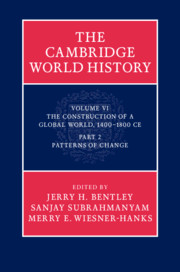Book contents
- The Cambridge World HistoryVOLUME VI
- The Cambridge World History
- The Cambridge World History
- Copyright page
- Dedication
- Contents
- Figures
- Maps
- Tables
- Contributors
- Preface
- Part One Migrations and Encounters
- Part Two Trade, Exchange, and Production
- 5 The Columbian Exchange
- 6 The slave trade and the African diaspora
- 7 The organization of trade in Europe and Asia, 1400–1800
- 8 Entrepreneurs, families, and companies
- 9 Silver in a global context, 1400–1800
- 10 Dutch and English trade to the East: the Indian Ocean and the Levant, to about 1700
- 11 Plantation societies
- 12 Industrious revolutions in early modern world history
- Part Three Religion and Religious Change
- Part Four Questions of Method
- Index
- References
12 - Industrious revolutions in early modern world history
from Part Two - Trade, Exchange, and Production
Published online by Cambridge University Press: 05 May 2015
- The Cambridge World HistoryVOLUME VI
- The Cambridge World History
- The Cambridge World History
- Copyright page
- Dedication
- Contents
- Figures
- Maps
- Tables
- Contributors
- Preface
- Part One Migrations and Encounters
- Part Two Trade, Exchange, and Production
- 5 The Columbian Exchange
- 6 The slave trade and the African diaspora
- 7 The organization of trade in Europe and Asia, 1400–1800
- 8 Entrepreneurs, families, and companies
- 9 Silver in a global context, 1400–1800
- 10 Dutch and English trade to the East: the Indian Ocean and the Levant, to about 1700
- 11 Plantation societies
- 12 Industrious revolutions in early modern world history
- Part Three Religion and Religious Change
- Part Four Questions of Method
- Index
- References
Summary
- Type
- Chapter
- Information
- The Cambridge World History , pp. 283 - 310Publisher: Cambridge University PressPrint publication year: 2015
References
Further Reading
- 5
- Cited by

